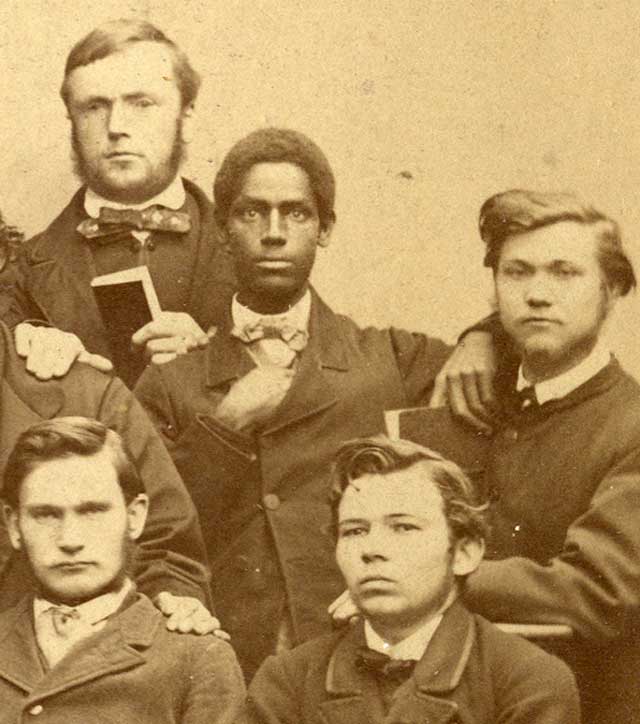Chronological overview of Ruufoo’s life and work
1848/1849:
Ruufoo was born in 1848 or 1849. He was from Gombotaa in the Muslim Kingdom of Guummaa (a Gibe state).
1860:
Ruufoo was sold to pay off his parents’ tax debts around 1860. He worked for several years as a slave, and during his temporary escape as a shepherd, in the predominantly Christian province of Gojjam.
1865:
Ruufoo was redeemed by St Chrischona Pilgrim missionary Johannes Eipperle at the slave market of Metemma at the end of 1865. This was done at the request of Krapf, who needed a native speaker to translate biblical texts into Oromo.
- In 1863, Krapf had successfully applied to the British and Foreign Bible Society (BFBS) for money for an Oromo as a translation assistant in Germany.
1866:
Missionary Wilhelm Bühler brought Ruufoo via Egypt, where they were joined by Mika’el Aregawi, to Basel. Ruufo continued his journey to Johann Ludwig Krapf in Korntal. On 30 August 1866, Krapf reported to BFBS that he had begun translation work with the native Oromo. Ruufoo attended school and confirmation classes in Korntal.
1867:
By February 1867, Ruufoo and Krapf had translated the Four Gospels, Acts, Romans and Gen 1-25 into Oromo.
- Ruufoo’s source text was the Amharic Bible translated by Abba Abraham and published by Platt (rev. edition, 1844). Krapf ensured that the translation remained faithful to the Greek New Testament and the Hebrew Old Testament. Rufoo and Krapf’s translation was written in Roman script.
March 1867: Krapf reported Ruufoo’s departure to Maienbühl (work centre affiliated with St Chrischona). During his absence, Krapf wanted to revise their draft and prepare a clean copy.
- It appears that Krapf did not make use of the Oromo translation of the aforementioned biblical books, which he had produced together with Barkii in the early 1840s.
April 1867: Krapf proposed that Ruufoo be deployed in the Pilgrim Mission’s print shop.
September 1867: At Krapf’s suggestion, Ruufoo was admitted to the boarding school for orphans called Pilgerhaus in Weinheim. Krapf hoped that Ruufoo’s classmate Aregawi would have a positive influence on his personal development.
1868:
Summer 1868: Ruufoo stayed at Krapf’s house in Korntal (probably during the school holidays). Krapf received aläqa Zännäb‘s Oromo translation of the Four Gospels in Ethiosemitic script and stopped translation work with Ruufoo.
- Krapf revised Ruufoo and his translation in the following months, strictly accounting for Zännab’s manuscript. The first biblical book in Oromo to be printed at the St Chrischona Mission Press was the Gospel of Luke in 1870.
Around September 1868: Ruufoo moved to Maienbühl. In November 1868, he visited Weinheim.
In the cold season, Ruufo fell ill with a lung disease at Maienbühl. He moved into the Spittlers’ house in Basel and was looked after by their housekeeper, Anjama.
1869:
Ruufo now showed genuine interest in baptism and attended baptismal classes.
23 May 1869: Ruufoo was baptized at the local church in St Chrischona. He received the new name Christian Paulus Ludwig Rufo.
September 1869: Ruufoo was admitted to St Chrischona Institute (Bible school).
November 1869: Due to his lung disease, Ruufoo was sent for further missionary training to Jerusalem. (He traveled there with Mr Haas.)
1870:
Krapf suggested that Ruufoo join the (Swiss francophone) Vaud Free Church Mission to reach out to the Oromo.
As Ruufoo’s health did not improve in Jerusalem, he was sent to the St Chrischona Mission Station in Cairo led by Pankratius Stamm. His wish to return to Ethiopia as a missionary was not fulfilled.
1871:
Ruufoo died in Cairo in January 1871.
Picture

(adapted from a picture deposited at Theologisches Seminar St. Chrischona)
Cross-references
» Krapf, Reference for Ruufoo
» Bibliography with links
» Published letter by Ruufoo
» Ledderhose (1867) on Ruufoo
— This overview is mainly based on
Smidt, Quellenübersicht.